Why even Michelin-starred chefs are WFH now
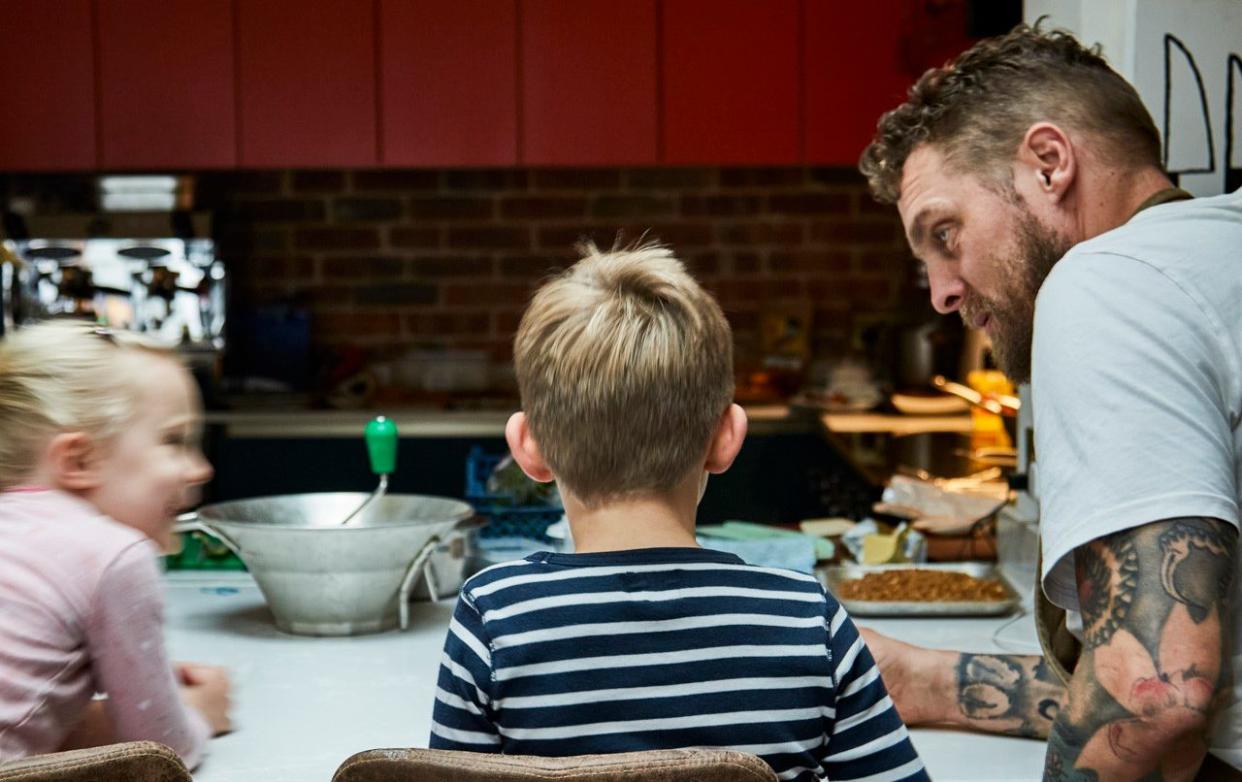
One of the pleasures of having dinner at someone else’s house is perusing their cookbook collection between courses.
Aaron Dalton, like many dads in their 40s, owns all the classics from the blokey-chef boom of the past 20 years: Tom Kerridge’s Proper Pub Food, Hugh Fearnley-Whittingstall’s The River Cottage Meat Book, an embarrassment of Jamie Olivers.
But peer closer and things become more niche: not only is there a shelf devoted to vegetarian dishes and another to the New Nordic movement of Noma et al, but four volumes of El Bulli technique and five of Nathan Myhrvold’s Modernist Cuisine.
Clearly, Dalton has a more-than-amateur interest in home entertaining. What’s cooking in Worthing?
From this month, his home is becoming Four, a two-nights-a-week restaurant that will see the 44-year-old prepare a 10-course, £120 menu served to 18 diners in the kitchen extension he has constructed for his suburban semi.
The professional chef – who has a sideline in building and carpentry – has taken as his blueprint the ‘chef’s tables’ of his former boss, Simon Rogan of L’Enclume fame.
But while there’s a counter overlooking the tweezering-and-tweaking chef action, and two dining tables behind, this is still recognisably a family kitchen, with alphabet magnets pinning weekly meal plans to the fridge and photographs of Dalton’s two young children on the counter.
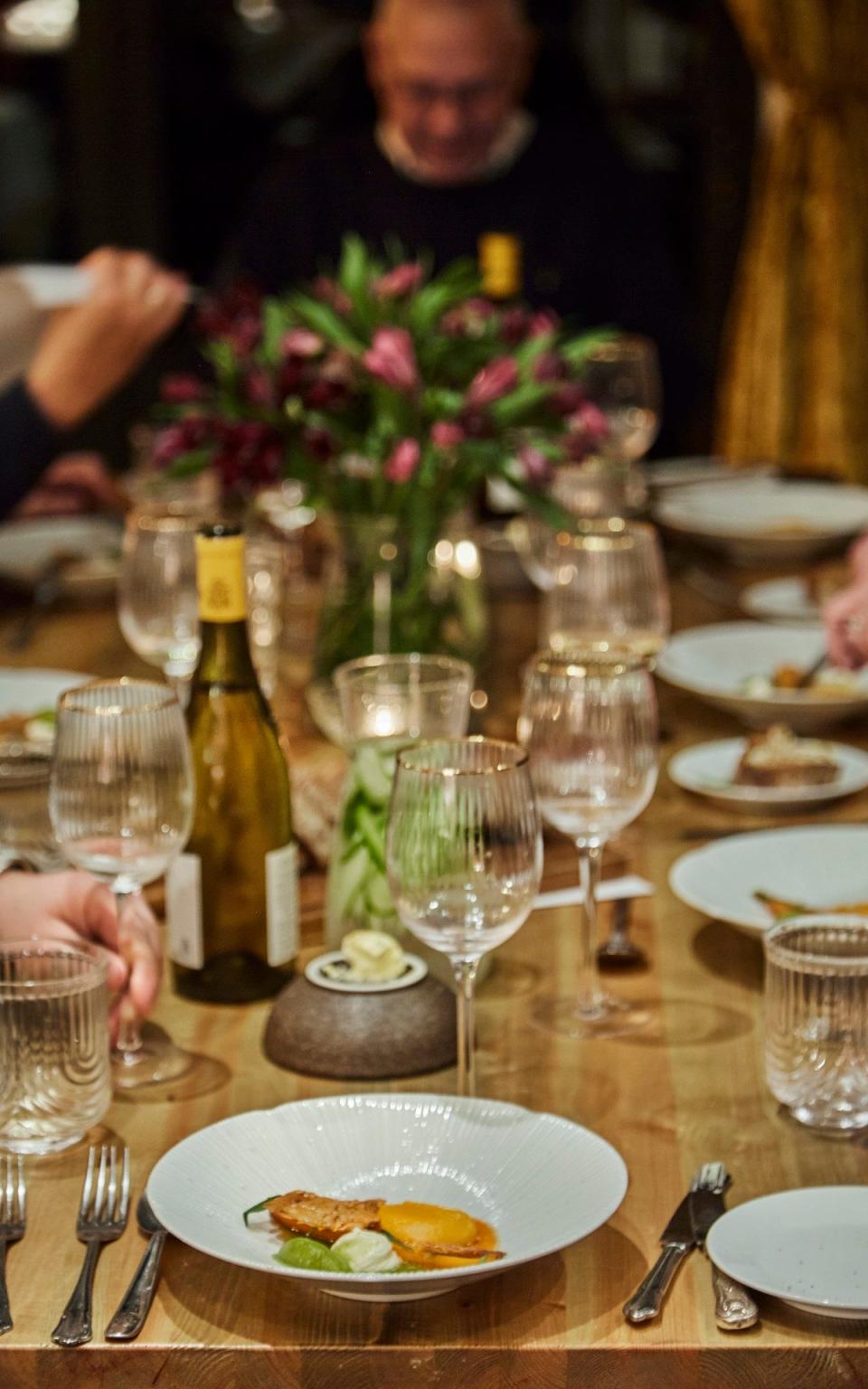
The menu is chalked up on a blackboard and written with the terse descriptions that are as much a part of any contemporary chef’s identity as Dalton’s heavily tattooed arms and Viking beard. The lack of words, however, should not be mistaken for an absence of ambition, judging by a recent preview dinner I attended.
‘Monkfish/pine’ involves shimmering discs of raw fish drizzled with pine oil from needles foraged by Dalton, and bathed in the intense umami of a dashi stock sharpened up with katsuobushi vinegar.
The unpromising-sounding ‘beef/smoked potato’ arrives as a finger’s width of rosy-red short rib that has been marinated in year-old fermented elderflower and smoked in Dalton’s garden to fall-apart tenderness.
Also on the plate is a fold of charred leek filled with a fine rubble of breadcrumbs fried in beef dripping and mixed with thyme, while on the side there’s a bowl of mashed potato made from spuds slow-cooked over a wood grill and whipped to such a level of smoothness that it is like eating a puff of smoke.
Once the initial murder-mystery-like surprise of having dinner in a stranger’s house – with another dozen or so strangers for company – has worn off, by the end of the evening, guests are wandering around Dalton’s kitchen as if they were in their own home.
‘I think walking into someone’s house and seeing kids’ shoes tucked away and then being fed exquisite food is a unique experience,’ says fellow guest Orlando Whippy, who works in recruitment and lives in Brighton.
‘It’s intimate and cosy, but with very different cooking to what you’d expect in the setting.’ And how does he feel about the £120-per-head bill? ‘If I were to invite a couple of families or a group of friends for an evening of private dining and being really looked after, that would feel like good value.’
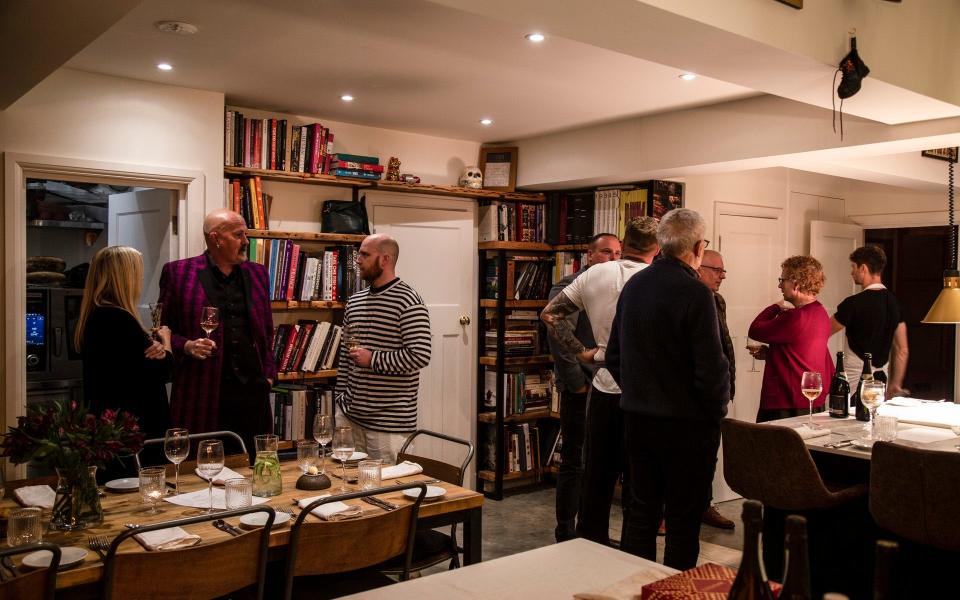
Dalton had worked in the kitchens of London restaurants such as Smoking Goat and Chez Bruce before moving back to his hometown of Brighton in late 2016 with his wife Sally, a paediatric nurse.
The couple ran a series of pop-ups, also called Four, for three years and planned to open a wood-fired restaurant in the city until the backers pulled out just before the pandemic hit. Lockdown was a mixed blessing for the family: restaurant work evaporated but Dalton got to spend time at home with Sally and their children while considering an alternative career to cheffing. He had long worked on and off for his dad’s carpentry business.
‘I made a commitment during lockdown to concentrate on carpentry,’ Dalton says. ‘I’d invested a lot of money in my tools and I thought traditional restaurants were dead in the water. Which brought me to this point, where I’ve built a restaurant in my own home myself.’
In late 2020, a crisis struck: Sally was diagnosed with cholangiocarcinoma, or bile duct cancer, adding urgency to a move to a new home down the coast in Worthing
The family was forced to reassess, and Dalton decided that the new semi would be perfect for an at-home restaurant. ‘Sally was up for it,’ Dalton says. ‘She was always the main admin person for the pop-ups and did the front of house. We were a fantastic team.’
A black-and-white photograph hanging above the counter, of the chef testing a spoonful of food on his wife, shows how playfully the couple worked together. ‘Then the cancer got worse and worse and she didn’t make it. When she died in December 2021 I was like – how am I going to keep cooking?’
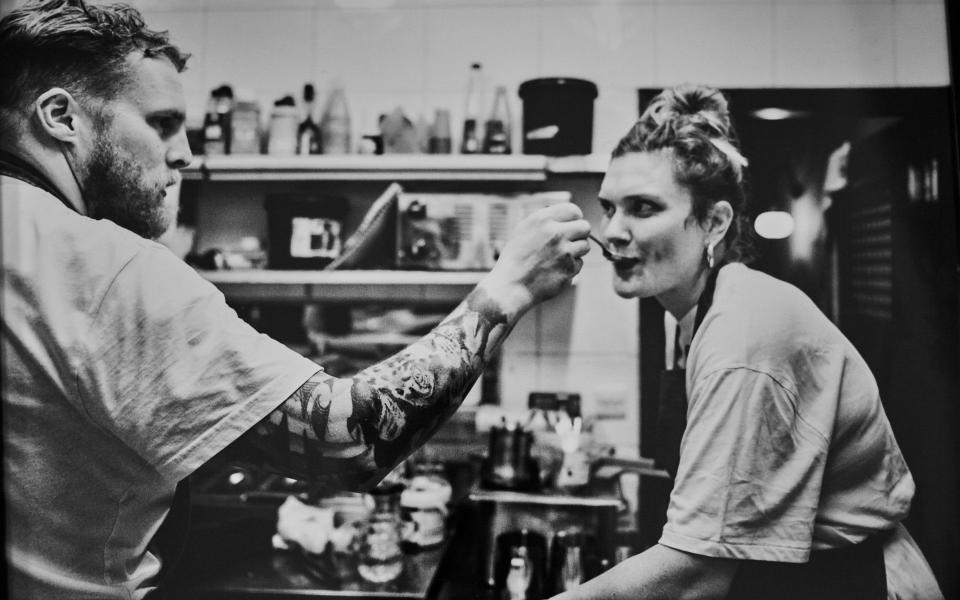
Dalton realised that raising his children as a single father would be incompatible with the long hours demanded by restaurants. ‘I lead by example when I’m in the kitchen and I try to do that with my kids. I’ve been battered by a tragic situation which at times has almost destroyed me. I’m still processing that grief.
‘But it hasn’t stopped me pushing to get my own restaurant and I thought, this is the perfect way to do that. I didn’t want the kids when they’re older saying that I gave up when their mum died.’
In addition to the extension, Dalton has built a wood-fired grill and smoker with a wood-fired oven outside, and added a pot-wash room off the lounge and dining area so guests never have to see dirty dishes. The cupboards to store the crockery are adorned with colourful door handles Sally had been collecting, which Dalton found in a pot after she died. ‘I’ve tried to delve into my inner Sally and design everything around her beauty.’
The colour scheme for the new kitchen was Sally’s idea; Dalton built everything else after she died. From each ticket sold, £5 goes to cholangiocarcinoma charity AMMF.
Dalton has funded the new Four through Sally’s life insurance and made financial savings by fitting out the place himself. He plans to become self-sufficient for energy by replacing gas with solar panels, which means his only major overhead will be his mortgage.
His working day begins with giving Rex, five, and Sylvie, four, breakfast and then taking them to school, before accepting deliveries, prepping ingredients and collecting the children in the afternoon.
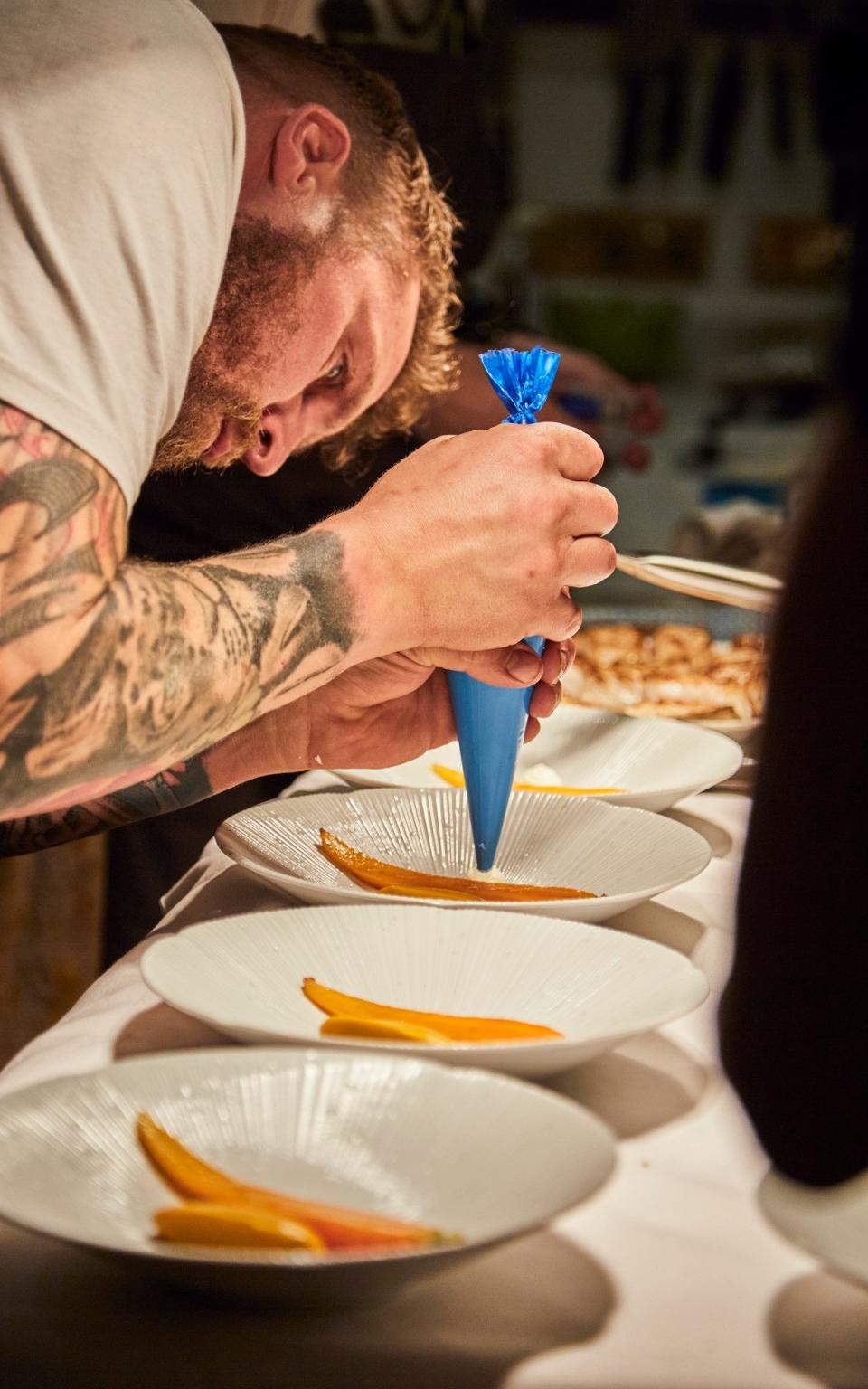
Dalton is subject to food-standards inspections, like any restaurant. For the first year, he plans to use his allowance of 12 temporary event notices for selling alcohol and be BYO the rest of the time. ‘What makes me nervous,’ he admits, ‘is, do I just stay registered as a supper club? The moment I become a legitimate business, the local authority is going to want a piece of the pie and for me to pay business rates.
‘Four is a way of earning money that allows me to spend time at home with my kids. Once it starts becoming complicated, I worry that the overheads will be too high to make it worth it.’
Dalton’s WFH response to the soaring costs of energy and restaurant rents, to say nothing of antisocial working hours, might sound like a novel solution to the crisis facing hospitality – but there are pioneers of the concept.

Seven years ago, Eddie Shepherd opened The Walled Gardens in the Manchester suburb of Whalley Range. Every Thursday to Sunday, three weekends a month, the chef serves a 12-course menu to eight diners per sitting. Guests must pay in advance for a plant-based menu priced at £110, which is not the hard sell one might assume: The Walled Gardens is booked solid five months ahead. Most customers aren’t even vegetarian.
Shepherd and his fiancée chose their home specifically because they saw the potential to host paying customers in its open-plan kitchen. ‘Sometimes people struggle to wrap their head around sacrificing a big chunk of your home for work,’ he admits, ‘and inviting guests into what is essentially your personal space. But because I’ve done that from the very start of living here, it feels very natural to me.’
He says he is working harder than he ever was in restaurants, but there’s a trade-off for spending time with his fiancée while he’s prepping for service and never having to worry about staffing issues since he works alone.
‘I feel very fortunate that I was in the position to create my own space here,’ he says. ‘Owning what you do as a chef is really hard to come by. I’m in my element in the kitchen, not spending time on systems and HR. This lets working on the food be 90 per cent of my focus.’
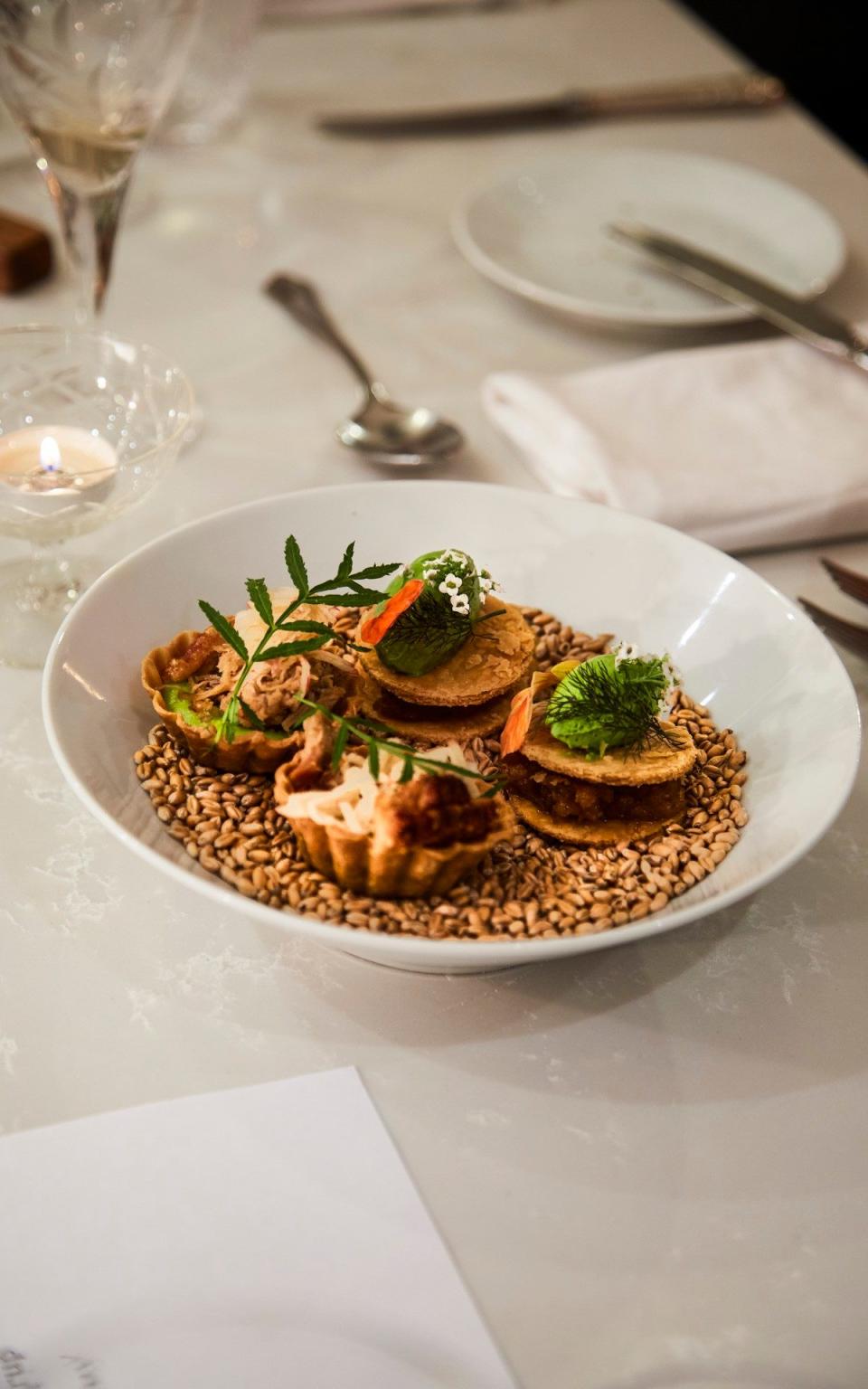
Shepherd says he doesn’t see himself as a trendsetter ‘but it’s cool to see other people doing this’. One of those is Marc Wilkinson, who closed Fraiche, the Michelin-starred restaurant he had operated for almost 20 years in Oxton, Merseyside, in April, to resurrect it in his new house near the Shropshire market town of Oswestry in August.
‘The thought of investing in another restaurant was a bit too scary for me because of the running costs,’ Wilkinson says. ‘To push the Oxton Fraiche forward and raise it to an even higher standard, it needed more staff. And the maths just didn’t add up.
‘My accountant was banging my head on the table and asking how it was going to be viable when things were already bad enough. It was a fair point. Now it’s literally just me so if I don’t get a wage, I don’t get a wage. I’ll see how I get on.’
For the time being, Wilkinson says the business plan for the new iteration, which he describes as a ‘chef’s table’ rather than a restaurant, is to break even. ‘That’s the bottom line. My expectation at the minute is just to pay the bills. And after Christmas, look at things properly through business eyes and do the financials to see if I’m just being a busy fool.’
Wilkinson certainly is busy. From Thursday to Saturday he greets eight guests at his new home for a £120, 12-course menu. He serves ‘a wave of snacks’ before the tasting menu begins, with ice buckets for guests to serve themselves the wine they have brought with them. One pair of guests gets to stay in Wilkinson’s spare room and have a six-course breakfast tasting menu, too.
‘There’s nowhere to hide in this new Fraiche,’ Wilkinson says. ‘I’m totally exposed in an open kitchen. It’s harder work than the old place because I’m covering all bases. I’m responsible for greeting guests, feeding them and clearing up after them. That makes me very conscious of quality and product. I’m not hiding in the kitchen and thinking, that’ll do. My constant thought is, don’t c—k up, Marc.’
Wilkinson says the level of expectation set by his Michelin-starred history has been both a help and a hindrance. For the first month of operation, the new Fraiche was full of guests who had followed him from Merseyside, but diners expect the same experience as when Fraiche was a restaurant proper.
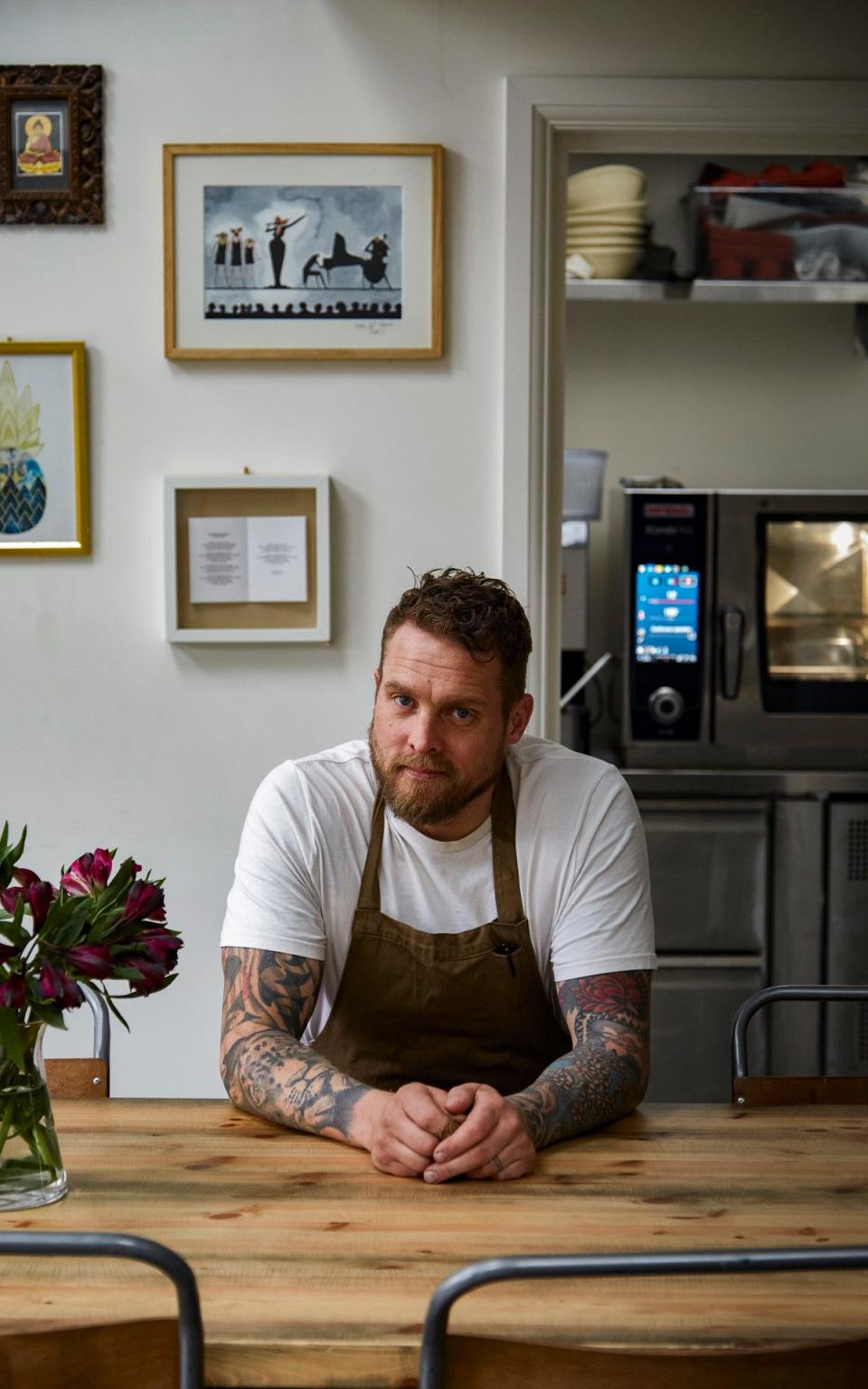
Which, for £120 a head, is perhaps unsurprising. With bespoke furniture, crockery and glassware, the chef thinks the experience is comparable to any Michelin-starred restaurant, but admits the famous red guide is, for now, unlikely to acknowledge an unlicensed venture in someone’s house.
‘Fraiche is a bit of an anomaly. It’s not a restaurant. But the perception of a supper club isn’t quite fitting. It sounds snobby and arrogant but I’m trying to offer so much more than that – something really top-end.’
Dalton and Shepherd ask guests to pay for their meal upfront via a ticketing system to avoid no-shows, which cost the restaurant industry close to £20 billion a year, while Wilkinson asks for a £25 deposit.
‘The Walled Gardens is very similar to being in a small restaurant,’ Shepherd says. ‘When there’s only space for eight guests, even one empty table will affect the atmosphere.’
Diners might enjoy the novel intimacy of the experience, but are these chefs sacrificing their whole family’s privacy? Wilkinson lives by himself. Dalton jokes that his kids are heavy sleepers but is planning to hire an au pair for the nights when he is downstairs feeding a houseful of diners, and he has laid a slate path for guests through the garden so they’re not ringing the front-door bell.
As for Shepherd’s fiancée, ‘she’s very, very patient and understanding about the situation’, he says. ‘Her job means that she’s still working while I’m doing the dinners and if she gets back before I’ve finished there’s a hob and a kettle upstairs. She doesn’t need to be hiding away from guests but it’s important that she has the space to do her own thing.’
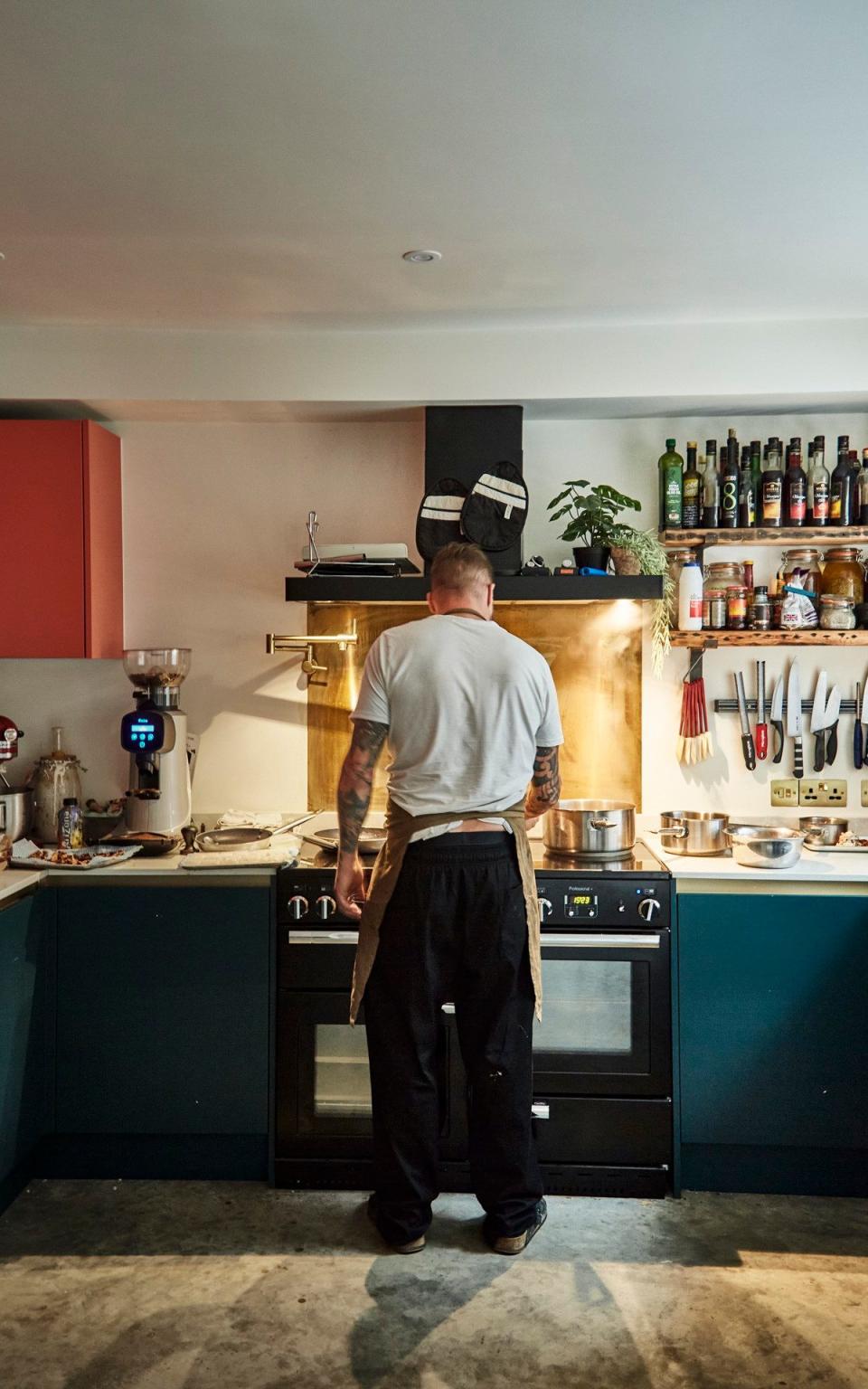
He and Wilkinson only reveal the exact location of their homes once a booking is made, so there’s no chance of diners popping in on the off chance. Understanding family members are one thing, but what about the neighbours? ‘I have to get on with my neighbours,’ Wilkinson says, ‘so I’m keeping a low profile and reassuring them that I haven’t opened a nightclub. There was a lot of fear in their eyes initially but I explained that this isn’t a 40-cover restaurant, it’s an eight-seat chef’s table.’
Dalton has soundproofed his whole house and designed the roof of his outdoor oven to funnel smoke away from his neighbours. In any case, the street is used to noise. Worthing FC is opposite and Dalton plans to sell casual food from the front garden on match days. And there are advantages to having a chef living next door: during lockdown, Shepherd made batches of bread and chocolate to share on his street.
The neighbours might be happy, then, but what about the chefs themselves? Wilkinson says Fraiche feels like home to him; Shepherd says he and his fiancée love being able to spread out in a large kitchen when The Walled Gardens is closed, even if he regrets not being able to fill it with cosy cushions now the weather has turned colder. And Dalton has found a way to achieve a work-life balance that allows him to spend weekends with his family.
‘I know what it takes to open a restaurant,’ Dalton says. ‘But ultimately my job is to be a dad and give my kids the best upbringing I can. I can’t justify my kids losing their mum and losing me at the same time just because I want to be a chef and a restaurant owner.’ This way, he can do both. ‘I want to create good food and I want to feed people and make them happy.’
To book to dine at Four Restaurant in Worthing, visit fourrestaurant.co.uk or follow @fourfooduk and @chefaarondalton on Instagram


